TRACY DELTA SOLID WASTE MANAGEMENT
Commercial Recycling & Organics information
New Statewide Organic Waste Regulations:
SB 1383 Short Lived Climate Pollutants
- Businesses are required to either:
- Subscribe to and participate in their jurisdiction's organics curbside collection service OR
- Self-haul organic waste to a specified composting facility, community composting program, or other collection activity or program.
- Businesses must provide collection containers for organic waste and recyclables in all areas where disposal containers are provided for customers, except in restrooms.
- If a business does not generate any of the materials that would be collected in a specific container, it does not have to provide that particular container.
- Internal containers must conform to the proper color requirements or labeling requirements.
- If a business chooses to use containers that are the correct color, internal containers do not need to be replaced until they are no longer functional or until January 1, 2036, whichever comes first.
- To reduce contamination, businesses must provide education to employees, contractors, tenants, and customers regarding how to properly sort organic material into the correct containers.
- Businesses must periodically:
- Inspect organic waste containers for contamination
- Inform employees if containers are contaminated
- Instruct employees about how to properly sort material into the correct containers.
- Businesses must provide organic waste collection services for:
- Employees
- Tenants
- Contractors
- Customers
- Businesses must supply and allow access to an adequate number, size, and location of containers with the correct labels or container colors.
- Annually educate employees, contractors, customers, and tenants on how to properly sort organic waste into the correct bins, AND
- Provide information to new tenants within 14 days of occupation of the premises.
- Employees, contactors, tenants, and customers must properly sort organic materials into the correct containers at business establishments.
MANDATORY COMMERCIAL RECYCLING & MANDATORY COMMERCIAL ORGANICS RECYCLING
TRACY DELTA SOLID WASTE MANAGEMENT-
COMMERCIAL ORGANICS RECYCLING
In October of 2014 Governor Brown signed AB1826 - Mandatory Commercial Organics Recycling, requiring businesses to recycle their organic waste on and after April 1, 2016 depending on the amount of waste generated per week. This applies to all businesses, including multifamily residential dwellings of five or more units. Organic waste is defined as food waste, green waste, landscape and pruning waste, nonhazardous wood waste, and food-soiled paper waste that is mixed in with food waste.
The minimum threshold of organic waste generation decreases throughout the implementation process, which means more businesses will be required to have an organics recycling program in place. The law phases in requirements on businesses, including multifamily residential dwellings that consist of five or more units. The following are the implementation dates and thresholds:
- April 1, 2016: Businesses that generate eight cubic yards of organic waste per week shall arrange for organic waste recycling services.
- January 1, 2017: Businesses that generate four cubic yards of organic waste per week shall arrange for organic waste recycling services.
- January 1, 2019: Businesses that generate four cubic yards or more of commercial solid waste per week shall arrange for organic waste recycling services.
- Summer/Fall 2021: If CalRecycle determines that the statewide disposal of organic waste in 2020 has not been reduced by 50 percent of the level of disposal during 2014, the organic recycling requirements on businesses will expand to cover businesses that generate two cubic yards or more of commercial solid waste per week.
*Please note multifamily dwellings are not required to have a food waste diversion program.
For more information on AB1826 Mandatory Commercial Organics Recycling visit CalRecycle at http://www.calrecycle.ca.gov/Recycle/Commercial/Organics/.
Organics recycling containers range in capacity from 96 gallon to 20 cubic yard. To setup an organics recycling program, please call 209-835-0601.
ASSEMBLY BILL 32 & ASSEMBLY BILL 341
The State of California has passed two new regulations for commercial and multi-family recycling, Assembly Bill 32 (California Global Warming Solutions Act of 2006) and Assembly Bill 341. The purpose of the laws is to reduce greenhouse gas emissions at the State level by diverting commercial solid waste through recycling programs.
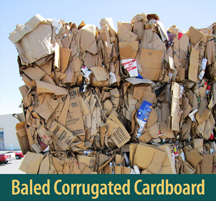
In order for the State to see further reductions in emissions, they are requiring all businesses that generate four cubic yards of refuse or more per week and any multi-family complex with five or more units to implement a recycling program by July 1, 2012. It is the responsibility of businesses to determine if they are required to participate and to implement the program. If you currently have recycling in place, you are in compliance with AB32 and AB341. If you do not have a recycling program in place, please contact our office and we will assist you with setting up a program.
Our role in the new regulations is to provide compliance assistance through a variety of recycling services. Those businesses that are not required to participate are still strongly encouraged to implement a recycling program. We offer a variety of source separated and commingled recycling services and all services can be tailored to fit the needs of your business or complex.
SOURCE SEPARATED RECYCLING SERVICES
Corrugated (Cardboard) Recycling
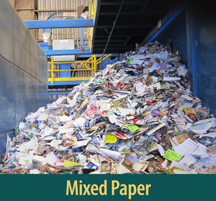 Tracy Delta Solid Waste Management provides cardboard bins ranging in size from 1.5 cubic yards through 40 cubic yards. The cardboard is picked up by a recycling truck on a regular route or can be picked up on an as-needed basis. All material must be clean and free from residual garbage.
Tracy Delta Solid Waste Management provides cardboard bins ranging in size from 1.5 cubic yards through 40 cubic yards. The cardboard is picked up by a recycling truck on a regular route or can be picked up on an as-needed basis. All material must be clean and free from residual garbage.
Tracy Delta Solid Waste Management can provide businesses and industries that generate large quantities of cardboard with either open top boxes or compactors. Compactors generally involve a contractual agreement and offer the customer revenue for their material. Many facilities have found that it is economical to replace high-labor balers with stationary compactors. The revenue generated by the cardboard varies with the current market value. All material must be clean and free from residual garbage.
The company also purchases baled and palletized cardboard. The price paid corresponds with industry standards and can be established by agreement or on a case-by-case basis.
White Office Paper
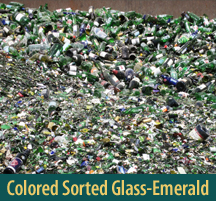 Tracy Delta Solid Waste Management also provides collection containers for white office paper. We generally place 60 gallon toters similar to the standard residential garbage or recycling containers in offices. They can be collected on a regular schedule or picked up on an as-needed basis. All white bond papers, such as letters, computer paper, copy paper, adding machine tape, stationary, envelopes, etc., are included in this program. This is a waste-reduction recycling service. Large amounts of white office paper may be recycled for revenue. Each program will be reviewed individually. All material must be clean and free from residual garbage.
Tracy Delta Solid Waste Management also provides collection containers for white office paper. We generally place 60 gallon toters similar to the standard residential garbage or recycling containers in offices. They can be collected on a regular schedule or picked up on an as-needed basis. All white bond papers, such as letters, computer paper, copy paper, adding machine tape, stationary, envelopes, etc., are included in this program. This is a waste-reduction recycling service. Large amounts of white office paper may be recycled for revenue. Each program will be reviewed individually. All material must be clean and free from residual garbage.
Other Types of Paper
Large quantities of newspaper, colored paper and specialty papers can be evaluated and priced on an individual basis as well. All material must be clean and free from residual garbage.
Wood
Large generators of scrap wood can arrange for debris boxes with up to a 40 cubic yard capacity. Prices for this service will vary depending on factors such as quantity, nature of the wood, cleanliness, etc.
Aluminum, Plastics & Glass
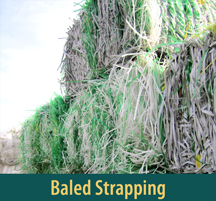 Tracy Delta Solid Waste Management can provide containers for aluminum, specific grades of plastic or color sorted glass. We review each request individually to determine the best container to fit your needs. All material must be clean and free from residual garbage.
Tracy Delta Solid Waste Management can provide containers for aluminum, specific grades of plastic or color sorted glass. We review each request individually to determine the best container to fit your needs. All material must be clean and free from residual garbage.
Plastic film, shrink-wrap, stretch-wrap, strapping etc. can be recycled as a separate commodity or mixed with other materials (per agreement). Every company has a unique need and we make every effort to provide a service that meets those needs.
There are multiple commodities that can be recycled. This often helps companies reduce waste costs and in some cases generate revenue, while diverting recyclable material from landfills.
COMMINGLED RECYCLING SERVICES
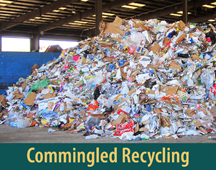
Tracy Delta Solid Waste Management also provides commingled recycling services for a fee. A commingled system allows customers to put all recyclables into the same container or bin with no sorting. In this method, all paper, cardboard and various recyclable containers are mixed together in a bin or container and are sorted at our facility. Please contact our office for further more information about this program.
MANDATORY COMMERCIAL RECYCLING- FREQUENTLY ASKED QUESTIONS
Please click the link below for a comprehensive list of Mandatory Commercial Recycling questions and answers developed by CalRecycle in response to stakeholder inquiries.
http://www.calrecycle.ca.gov/climate/recycling/faq.htm
|